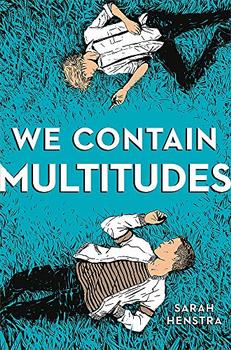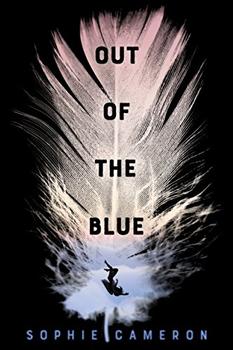Summary | Excerpt | Reviews | Beyond the book | Read-Alikes | Genres & Themes | Author Bio

Jude and Noah are twins. They are also artists. When they are 13, Noah draws a picture and Jude falls madly in love with it. She asks Noah if she can have it, and Noah replies:
This shocks me. She's never asked for a drawing before. I'm horrible at giving them away. "For the stars, oceans, and all the trees, I'll consider it," I say, knowing she'll never agree. She knows how badly I want the sun and the trees. We've been dividing up the world since we were five. I'm kicking butt at the moment – universe domination is within my grasp for the first time.
Are you kidding?" she says, standing up straight…"That leaves me just the flowers, Noah."
Fine, I think. She'll never do it. It's settled, but it isn't…
"Okay" she says. "Trees, stars, oceans, Fine."
"And the sun, Jude."
"Oh, all right," she says, totally surprising me. "I'll give you the sun."
The twins have played this game all their lives: trading the world for their desires. But when Jandy Nelson's second novel, I'll Give You The Sun, opens, Jude and Noah's hearts have been broken and burst wide open. Nelson's structure is unique and, quite honestly, brilliant. The story is told in long, alternating chapters — Noah tells his half before their mother's car accident, when the twins are 13; and Jude tells hers after, when they are 16. What happened in the three years in between? The time is thick with miscommunication, deception and silence. Noah and Jude, once inseparable, have been torn apart. But why? They each only know their half of what happened, and as the reader learns the whole truth, so do they.
I'll Give You The Sun opens grief wide and examines it with a magnifying glass. Noah and Jude have lost their mother, and this colors (or drains the color from) their lives. Also gone, is their grandmother, who was a large, eccentric presence. On top of these deaths, they have experienced other challenges. Their father has withdrawn from them, Noah has not gotten into the art school he was desperate to attend, Jude is moments away from being kicked out of the same school, and, front and center, is the loss of their friendship.
Nelson gets at that grief with prose that is simply spectacular. It is visceral and, just like the cover of the young adult novel, – a burst of colorful rays growing out of the title – it explodes with emotion. Noah's point of view is visual, and Jude's is sensual and physical, full of references to bodies, feelings, and the intersection of the two. Noah imagines paintings inside his head, making art out of every emotion he feels. Jude holds tight to her dead grandmother's eccentric superstitions, all kept in a "Bible" (scrapbook) that she clutches, desperately hoping that she can find some solution to the guilt and grief she feels.
Here is Noah:
I start to run, start to turn into air, the blue careening off of the sky, careening after me, as I sink into green, shades and shades of it, blending, spinning into yellow, freaking yellow, then head-on colliding into the punk-hair purple of lupine: everywhere. I vacuum it in, all of it, in – (SELF-PORTRAIT: Boy Detonates Grenade of Awesome) – getting happy now, the gulpy, out-of-breath kind that makes you feel you have a thousand lives crammed inside your measly one…
And here is Jude, describing her father:
His pants are always too big and belted awkwardly so he looks like a scarecrow, like if someone pulled the belt he'd turn into a pile of straw. This might be my fault. Grandma and I have largely taken over the kitchen, using the bible as cookbook:
To bring joy back to a grieving family, sprinkle three tablespoons of crushed eggshells over every meal.
Through gorgeous poetic language, and no-holds-barred examination of both emotion and its consequences, Nelson reminds us that we can only ever know our own perspective, and that seeking out other people's is the key to seeing the whole picture, and to survival. But in the end, this novel is a plea for deep love, and a testament to its power to heal. You don't read it as much as ingest it, gulp by gulp. It is that rich. It is that big and that alive. In I'll Give You The Sun, Jandy Nelson gives her readers the trees, the stars, the oceans and, yes, the sun.
![]() This review was originally published in The BookBrowse Review in September 2014, and has been updated for the
November 2015 edition.
Click here to go to this issue.
This review was originally published in The BookBrowse Review in September 2014, and has been updated for the
November 2015 edition.
Click here to go to this issue.

If you liked I'll Give You the Sun, try these:

by Sarah Henstra
Published 2020
Aristotle and Dante Discover the Secrets of the Universe meets I'll Give You the Sun in an exhilarating and emotional novel about the growing relationship between two teens boys, told through the letters they write to one another.

by Sophie Cameron
Published 2019
When otherworldly beings start falling from the sky, it seems like the end of days are near - but for one girl, it's just the beginning of an adventure that will change her life.
Your guide toexceptional books
BookBrowse seeks out and recommends the best in contemporary fiction and nonfiction—books that not only engage and entertain but also deepen our understanding of ourselves and the world around us.